|
CONTENTS
Democratic People's Republic of Korea
• 8th Congress of Workers' Party of Korea Sets Ambitious Program
Oppose Military Exercises
Targeting DPRK
• U.S.,
Korean and International Organizations Call for
Suspension
of U.S.-ROK Joint Exercises
• Plans of Workers' Party of Korea to Strengthen Movement
for Peace and Reunification
Developments on the Economic Front
• Difficulties
Facing the Economy and Plans to Change the
Situation for the Better
• Key Industrial Sectors Which Form Lifeline
of National Economy
Democratic People's Republic of Korea

The 8th Congress of the Workers' Party of Korea (WPK) was held in
Pyongyang, Democratic People's Republic of Korea (DPRK) from January 5
to 12. Attending the Congress were 4,750 delegates, including 1,455
industrial workers and farmers, and 10 per cent were women. There were also
2,000 observers.
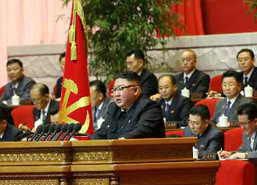 Kim Jong Un, the Supreme Leader of the DPRK, presented the Report on
the work of the Central Committee of the WPK since the previous congress in 2016, which was
thoroughly discussed. Kim Jong Un, the Supreme Leader of the DPRK, presented the Report on
the work of the Central Committee of the WPK since the previous congress in 2016, which was
thoroughly discussed.
In
his presentation, Kim Jong Un stressed that in the period of five years
since the 7th Congress, even taking into account the difficulties and
setbacks, the successes of the WPK in its revolutionary struggle
and construction work are no small matter. "During the period under
review our internal force was further expanded and strengthened, and
the external prestige of the country was raised remarkably. This is a clear signal that a new period of new upsurge, a
period of gigantic transformation, has arrived for socialist
construction," Kim Jong Un said. "The Central Committee of our Party
made it clear at home and abroad that it would make this Congress a
congress for work, struggle and progress," he added.
The Report consisted of four sections:
1. Achievements Made in the Period under Review;
2. For an Epoch-making Advance in Socialist Construction;
3. For Independent Reunification of the Country and Development of External Relations; and
4. For Development of Party Work.
After the presentation on the work since the 7th Congress, many
delegates spoke to the Report. The Congress also elected the new
Central Committee and elected Kim Jong Un as General Secretary of the
WPK. It adopted amendments to the Party Constitution and received the
report of the Audit Commission. The
Congress then solemnly and unanimously adopted the
resolution "On Consistent Implementation of the Tasks Outlined in the
Report of the WPK Central Committee."
General Secretary Kim Jong Un delivered the closing address. He
appreciated the revolutionary enthusiasm of the Party and people, and
thanked all Party members, people and service
personnel for placing their trust in him. He said that the 8th Congress
had formulated an immediate plan for the struggle to open up a fresh
period of upsurge, a period of great changes in
the revolution and construction, and that it had revealed important
issues which had arisen in the development of the Party, and had
sincerely discussed them. He expressed confidence that
the strategy and politics of the Congress would be successfully
implemented.
Saying that everyone should be ready for a more difficult offensive
in making a head-on breakthrough so as to win victory afresh and make
progress in accomplishing the cause of
socialism, Kim Jong Un passionately appealed to everyone to be more
dynamic in struggling to successfully fulfil the program advanced at
the 8th Congress, in developing the WPK and for
the victorious advance of the revolutionary cause of Juche and putting
the interests of the people of the DPRK at the centre of all
achievements.
The Congress came to a close on January 12 with a performance of
"The International." Following its successful conclusion, the 4th
Session of the Supreme People's Assembly was
convoked on January 17, at which Premier Kim Tok Hun called for
thoroughly carrying out the five-year plan for national economic
development set out in the WPK Congress, outlining
some of the necessary key tasks to accomplish this. The
Communist Party of Canada (Marxist-Leninist) sent a message of
greetings to the Congress and a message of congratulations to Kim Jong
Un on his election to the post of General Secretary of the Central
Committee. CPC(M-L) expressed its confidence that the decisions taken
by the Congress will guide the Party, the State and the People to
further overcome the effects of the brutal sanctions regime
imposed by the U.S. imperialists, which Canada also enforces, while they
also further the cause of peace on the Korean Peninsula and for the
reunification of the Korean nation. The results the Korean people have
achieved in building a prosperous nation on the basis of self-reliance
are remarkable. They show many things in terms of the activation of the
human factor/social consciousness and innovations in the use of science
and technology in a manner which serves the people. Of great
significance, they show the potential energy which lies within
humanity's striving to exercise control over all aspects of living. 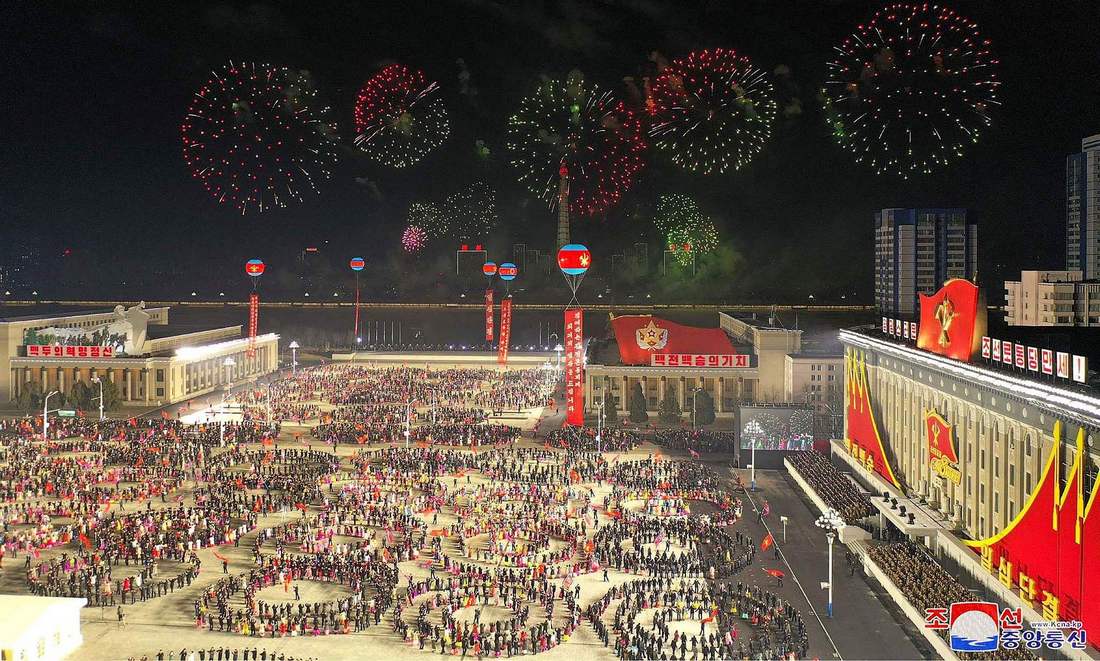
January 14, 2021. Celebrations following successful
conclusion of the 8th WPK Congress.

Oppose Military Exercises
Targeting DPRK

August 5, 2019. Protest outside U.S. Embassy in
Seoul, Korea.
On January 27, a statement endorsed by 110 U.S.,
197 south Korean,
and 80 international civil society organizations
was sent to U.S. President
Biden calling on the U.S. to suspend all
annual combined military exercises with the
Republic of Korea (ROK) in order to restart
diplomacy with the Democratic People's Republic of
Korea (DPRK).
 This initiative was
organized by U.S. and south Korean peace
groups, including: Korea Peace Campaign of
Veterans for Peace; Korea
Peace Network; Korea Peace Now!
Grassroots Network; Peace Treaty Now; Women Cross
DMZ; Women's International League for Peace and
Freedom; Civil Peace
Forum; Korean Women's Movement
for Peace; and South Korean Committee on June 15th
Joint Declaration. This initiative was
organized by U.S. and south Korean peace
groups, including: Korea Peace Campaign of
Veterans for Peace; Korea
Peace Network; Korea Peace Now!
Grassroots Network; Peace Treaty Now; Women Cross
DMZ; Women's International League for Peace and
Freedom; Civil Peace
Forum; Korean Women's Movement
for Peace; and South Korean Committee on June 15th
Joint Declaration.
Spokesperson Colonel Ann Wright of the Korea
Peace Campaign of
Veterans for Peace organization said, "These war
drills are expensive,
provocative, and consistently provoke north
Korea to take military actions in response. If the
United States' goal
is to reduce tensions, not increase them, then
suspending these
military exercises will be an important step
forward."
Hyun Lee of Women Cross DMZ and Korea Peace Now
said, "The majority
of citizens on the Korean Peninsula want peace
talks, not war drills
and military confrontation. It's their
lives that are at risk from the possibility of
military exercises
leading to mistakes and accidents that may cause
disastrous military
confrontation."
The organizers are calling on individuals to sign
onto the statement
and in so doing, join with many others from the
U.S., south Korea and
around the world working to promote peace
on the Korean Peninsula.
Statement
We, the undersigned civil society organizations
in the United
States, south Korea, and around the world, call on
President Biden to
suspend the annual U.S.-south Korea (ROK)
combined military exercises. Suspending these
costly and highly
provocative war exercises will be a crucial step
toward re-starting
genuine diplomacy with north Korea (DPRK). It will
remove a formidable obstacle to a peaceful
resolution of the ongoing
70-year-old Korean War and allow all parties to
focus on other
intractable global issues facing our nations
today, such
as creating a nuclear weapons-free world and
resolving the current
COVID-19 pandemic.
 In the mid-1950s,
just after the Korean War, the U.S. and ROK began
combined military exercises in south Korea that
prepare for war with north Korea. In the 1970s the
drills
developed into large-scale exercises that mobilize
considerable
weapons, equipment and the deployment of U.S.
troops stationed in both south Korea as well as
U.S. bases outside the
Korean Peninsula. Since the 2000s they have been
based on operation
plans that reportedly include pre-emptive strikes
and "decapitation
measures" against the north Korean leadership. Due
to their scale and provocative nature, the annual
U.S.-ROK combined
exercises have long been a trigger point for
heightened military and
political tensions on the Korean Peninsula. In the mid-1950s,
just after the Korean War, the U.S. and ROK began
combined military exercises in south Korea that
prepare for war with north Korea. In the 1970s the
drills
developed into large-scale exercises that mobilize
considerable
weapons, equipment and the deployment of U.S.
troops stationed in both south Korea as well as
U.S. bases outside the
Korean Peninsula. Since the 2000s they have been
based on operation
plans that reportedly include pre-emptive strikes
and "decapitation
measures" against the north Korean leadership. Due
to their scale and provocative nature, the annual
U.S.-ROK combined
exercises have long been a trigger point for
heightened military and
political tensions on the Korean Peninsula.
For years these combined military exercises have
involved the use of
B-2 bombers (which are designed to drop nuclear
bombs), nuclear-powered
aircraft carriers and submarines, as well
as the firing of long-range artillery and other
weapons. They not only
increased tensions on the Korean Peninsula, they
have cost U.S.
taxpayers billions of dollars and have caused
irreparable harm to local residents and the
environment in south Korea.
At a time when the world is facing urgent
humanitarian,
environmental, and economic crises, these military
exercises divert
critically needed resources away from our capacity
to
provide true human security such as health care, a
sustainable
environment, and other priorities. Furthermore,
they heighten
geopolitical tensions and risk re-igniting a hot
war on the Korean
Peninsula, which would have catastrophic
consequences for millions of
people.
We want peace talks, not war drills and military
confrontation. We
urge the Biden Administration to resolve the root
cause of the conflict
between the United States and north Korea --
the unresolved Korean War -- which has driven a
dangerous arms race,
harmed the most vulnerable people through
punishing sanctions, and
enforced the tragic separation of hundreds of
thousands of Korean families. Continuing to rely
on isolation,
pressure, and threats to force north Korea's
unilateral
denuclearization is a recipe for failure.
Suspending the combined military exercises will
be a major
confidence-building measure toward renewing
diplomacy to resolve the
longstanding 70-year-old conflict with north Korea
and, ultimately, achieve permanent peace and
denuclearization of the
Korean Peninsula.
Signed by 387 U.S., south Korean and
international organizations.
To sign the statement click
here. For statement in Korean click here.

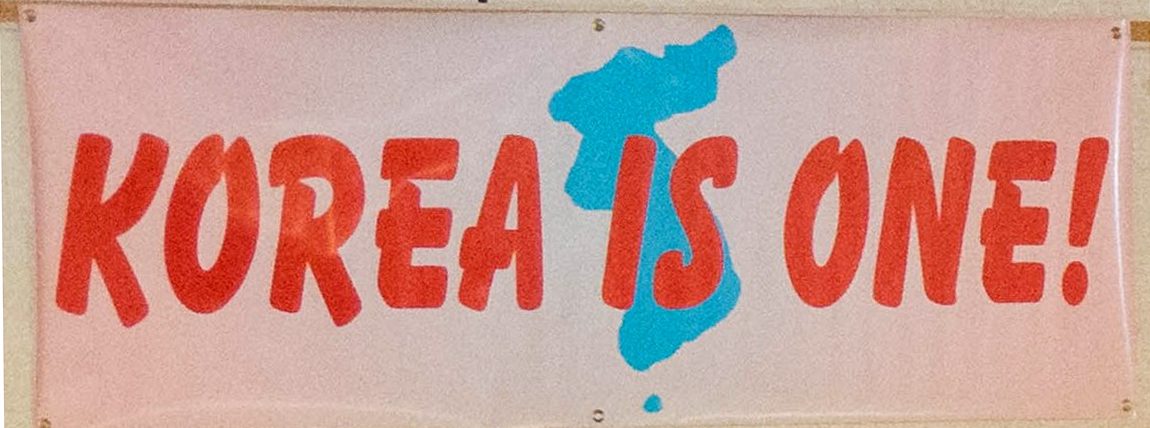
The 8th Congress of the Workers' Party of Korea
(WPK), held in the
Democratic People's Republic of Korea (DPRK) from
January 5 to 12,
addressed important issues for the
independent reunification of the country and
development of external
relations. Referring to the Report delivered to
the Congress by Kim
Jong Un, the Supreme Leader of the DPRK, the
Korean Central News Agency (KCNA) published the
following account of
the discussion:
"Our nation is now standing on the crucial
crossroads of whether to
advance along the road of peace and
reunification," Kim Jong Un said.
"It is no exaggeration to say that the current
inter-Korean relations have been brought back to
the time before the
publication of the Panmunjom Declaration and the
hope for national
reunification has become more distant."[1]
The Report to the WPK's 8th Congress stressed
that north-south
relations cannot thaw by the efforts of one side
alone nor improve by
themselves with the passage of time. To thaw
relations, the Report said, it is necessary to
take a stand to resolve
the basic problems first in the north-south
relations; halt all acts
hostile toward the other side, and seriously
approach and
faithfully implement the north-south declarations.
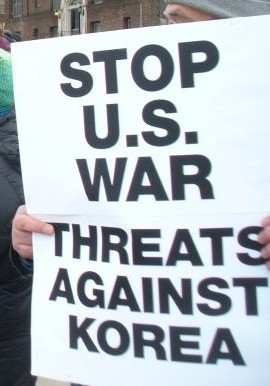 Kim Jong Un
clarified the WPK's principled stand on
inter-Korean
relations as follows: Kim Jong Un
clarified the WPK's principled stand on
inter-Korean
relations as follows:
The south Korean authorities
are going against
the implementation of the north-south agreement
on guaranteeing peace and military stability on
the Korean Peninsula.
In disregard of our repeated warnings that they
should stop introducing
the latest military hardware and joint military
exercises with the U.S., the south is securing and
developing new
cutting-edge offensive equipment including
ballistic and cruise
missiles.
At the present moment the DPRK does not need to
show goodwill to the
south Korean authorities unilaterally as in the
past, and the DPRK will
treat them according to how they
respond to our just demands and how much effort
they make to fulfill
the north-south agreements.
The third part of the Report to the WPK's 8th
Congress also noted
that whoever took power in the U.S., the real
intentions of its policy
toward the DPRK would never change. The Report stressed the need for an "adroit" strategy
towards the U.S.
while at the same time steadily expanding
solidarity with the
anti-imperialist, independent forces.
The Report also referred to the need to frustrate
the reactionary
offensive of the enemy and raise the prestige of
the DPRK by enhancing
the role of the external information sector. It
stressed the need for the field of external work
to further develop
relations with the socialist countries, and
consolidate unity and
co-operation with the revolutionary and
progressive parties
which aspire for independence, and launch a
dynamic joint struggle
against imperialism on a worldwide scale so as to
make the external
environment of the DPRK evermore
favourable.
The Report expressed the steadfast determination
of the WPK to
reliably defend the peace and stability of the
Korean Peninsula as well
as of the rest of the world. There is no country
on this planet, it said, which is permanently
exposed to the threat of
war as is the DPRK, nor a country as strong in its
people's desire for
peace.
The
Report to the 8th Congress points out that "we have stored the
strongest war deterrent, and steadily develop it, aimed at defending
ourselves and opening up an era of genuine peace free from war
forever. Now that our national defence capability has risen to
such a level that it can pre-emptively contain the threat of the
hostile forces outside our territory, in the future any heightening of
tensions on the Korean Peninsula would lead to the instability of
security on the part of the forces posing a threat to us."
Stating
that the key to establishing a new DPRK-U.S. relationship lies in the
U.S. withdrawal of its hostile policy toward the DPRK, the Report
clarified the WPK's stand that it would approach the U.S. on the
principle of power for power and goodwill for goodwill in the future,
too. It reaffirmed that the DPRK, as a responsible nuclear weapons
state, will not use its nuclear weapons unless the aggressive hostile
forces try to have recourse to their nuclear weapons against the DPRK.
By clarifying the foreign policy and stand of the
WPK for
strengthening friendship and solidarity with all
the countries in the
world respecting the sovereignty of the DPRK and
for
achieving genuine international justice, the Report on the work of the
Central Committee of the WPK provided strategic
and tactical guidelines
for further increasing the DPRK's
international authority and influence in the new
period to be reviewed,
KCNA says.
Note
1. The Panmunjom
Declaration for Peace, Prosperity and
Reunification of the Korean
Peninsula was signed by Kim Jong Un,
Chairman of the DPRK and Moon Jae-in, President
of the Republic of
Korea on April 27, 2018, following north-south
summit talks at the
House of Peace, Panmunjom.

Developments on the Economic Front
The guiding outlook for the economy of the
Democratic People's
Republic of Korea (DPRK) is "everything for the
people and everything
by relying on them" within an overall
determination of self-reliance.
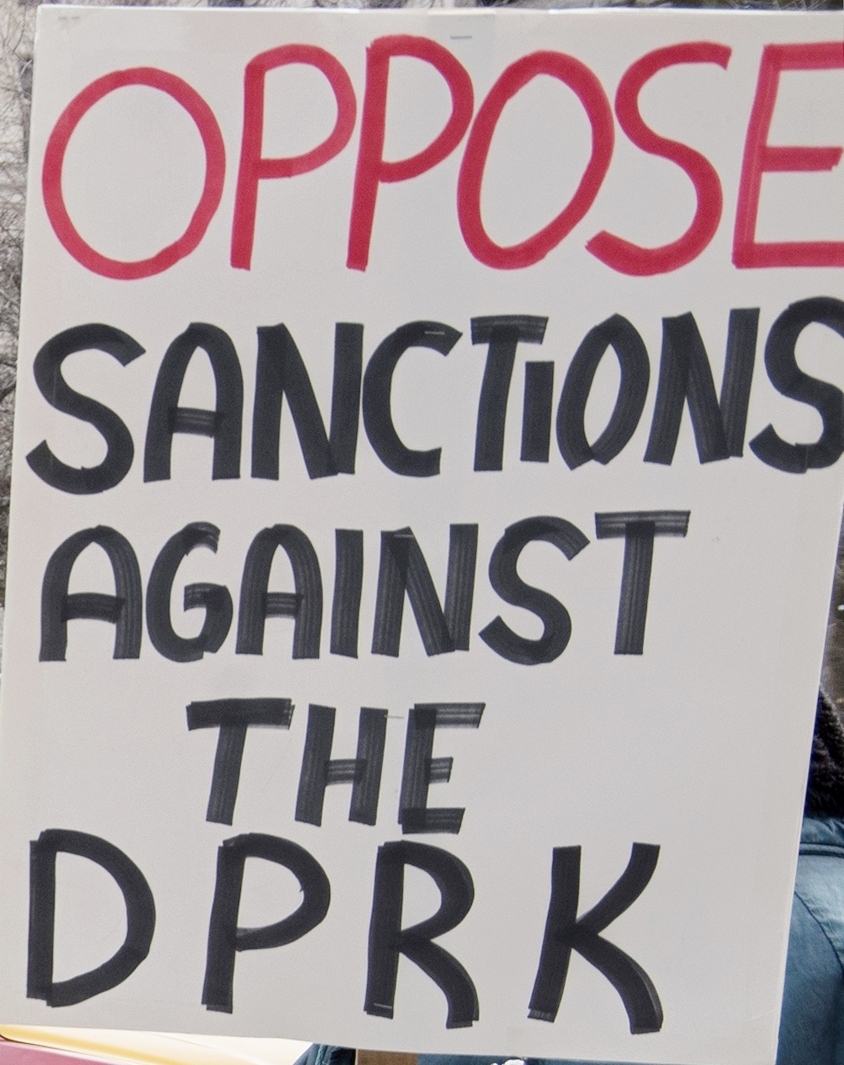 The overriding
objective factor for the economy during the past
five
years was the U.S.-led killer sanctions and
blockade of the DPRK --
enforced by Canada as well -- which cause great
hardship for the people, and the ongoing threats
of military
annihilation. In addition the country was battered
yearly with severe
natural disasters and last year with the global
pandemic.
Taking all of this into account, the leader of the
DPRK, Kim Jong Un
said in his Report to the 8th Congress of the
Workers' Party of Korea (WPK),
"the successes of the WPK in the last five
years in its revolutionary struggle and
construction work are no small
matter." The overriding
objective factor for the economy during the past
five
years was the U.S.-led killer sanctions and
blockade of the DPRK --
enforced by Canada as well -- which cause great
hardship for the people, and the ongoing threats
of military
annihilation. In addition the country was battered
yearly with severe
natural disasters and last year with the global
pandemic.
Taking all of this into account, the leader of the
DPRK, Kim Jong Un
said in his Report to the 8th Congress of the
Workers' Party of Korea (WPK),
"the successes of the WPK in the last five
years in its revolutionary struggle and
construction work are no small
matter."
"Last year was a quite difficult year; in the
circumstances of the
world public health crisis that lasted
unprecedentedly long in history,
they consistently ensured a thoroughgoing stable
situation in infectious disease prevention by
stubbornly overcoming the
difficulties, maintaining the conscious unity of
all the people in this
effort, and regarding it as a patriotic duty
devolving on them; they also rose up in the
struggle for recovering
from the natural disasters and built more than
20,000 splendid new
houses in different parts of the country. This
great
achievement left another proud page in our Party's
record of struggle," he said.
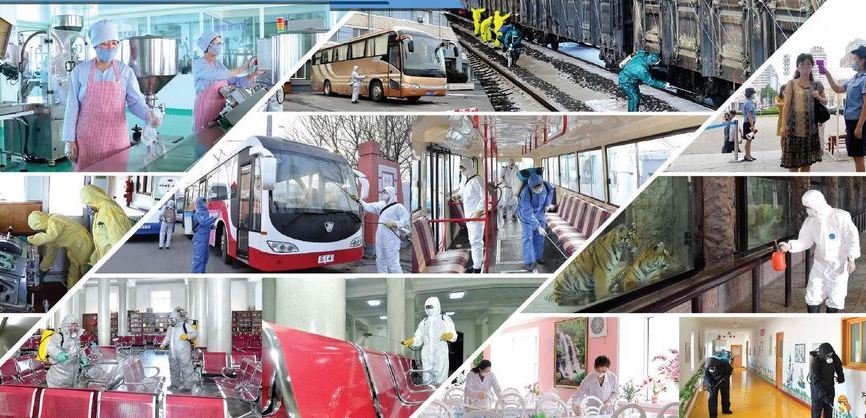
Keeping the public safe during the COVID-19
pandemic
In this context, Kim Jong Un explained, "However,
though the period
of implementing the Five-Year Strategy for the
National Economic
Development ended last year, almost all
sectors fell a long way short of the set
objectives." He pointed to the
external and internal challenges that still exist
and that the key to
making a breakthrough is to consolidate the
internal
strength of the DPRK.
The Congress made "a comprehensive and profound
analysis and
judgment of the experiences, lessons and mistakes
we have made during
the period under review and, on this basis,
define the scientific goals and tasks of struggle,
which we can and
must accomplish without fail. The successes we
have already achieved
are priceless for us, and so are the bitter
lessons
that have been accumulated. All these are things
that cannot be
bartered even for gold, and constitute valuable
assets for achieving
fresh victories in the future. We should further
promote
and expand the victories and successes we have
gained at the cost of
our sweat and blood, and prevent the painful
lessons from being
repeated. In particular, we should be bold enough
to
recognize the mistakes which, if left unaddressed,
will grow into
bigger obstacles and stumbling blocks, and take
resolute measures
against their repetition. This Congress has been
convened
on the basis of this pluck and commitment."
The Korean Central News Agency (KCNA) informed
that underlining the
need to start the work for further developing the
overall economy of
the country under a new five-year plan,
the Report of the 8th Congress analyzed the
present state of the key
industrial sectors including metal, chemical,
electricity, coal,
machine and mining industries and set forth the
tasks for
future development.
The Report given at the second-day sitting
analyzed the situation of
the transport, capital construction and
building-materials industry,
communications, commerce, land and environment
protection, urban management, external economic
relations and other
major sectors and economic management fields and
presented the goals
and practical ways for making innovations and
development in the relevant fields during a new
five-year plan.
The Report also referred to the solutions in
making a tangible
turning point in improving the people's living
standards by achieving
planned and continuous growth of production in the
fields of agriculture, light industry and the fishing
industry, and by
developing cities and counties in an independent
and many-sided way.
It clarified again that there is a significant
determination to
protect the security of the country and people and
the peaceful
environment of socialist construction by reliably
placing the
state defence capability on a much higher level,
and it put forth goals
for realizing that.
The Report also put forward details of important
tasks for promoting
the scientific and technological development of
the country.
"The cause of non-fulfillment of the five-year
strategy for the
national economic development" could not be solely
attributed to the
material conditions. To make such an assessment
would suggest that the human factor "can do
nothing" and "the action
and role of the driving force would be
unnecessary" making it
"impossible to accelerate the revolutionary
struggle and
construction work unless the unfavourable external
factors are removed."
Within the conditions, the Report said the
previous "five-year
strategy for national economic development had not
been properly set on
the basis of scientific calculation and grounds,
that science and technology failed to play the
role of propelling
forward the economic work of the country, and the
work of readjusting
and reinforcing the irrational economic work
system
and discipline was not properly done."
"The economy of the country can never be boosted
without breaking
with the wrong ideological viewpoint,
irresponsible working attitude,
incompetence and obsolete working manner
that have been prevalent so far," the Report
concluded. By transforming
the subjective conditions, the problems and damage
of the objective
conditions can be overcome.
The economic strategy for the next five years is
to put "our economy
on a normal track to run smoothly without being
affected by any
external influence" and give material expression
to self-reliance and the economy's full potential.
This means to
concentrate on the internal organization of the
national economy and
the development of all its sectors and links from
one
department to the next so as to improve the
people's standard of living.
The main industrial departments that require
investment and focus to
improve and normalize production are the metal and
chemical industries,
the production of the material and
machinery necessary for industry to flourish,
especially agriculture,
the local supply of raw material and equipment for
the production of
articles of consumption and the generation of
electricity.
Nationwide planned self-reliance and
self-sufficiency through the
mobilization of the people and the use of science,
modern technology
and increased investments in education are
essential in "perfecting the self-supporting
structure of the national
economy, lowering the proportion of dependence on
imports and
stabilizing the people's standard of living."

Metal Industry
The Report to the 8th Congress of the Workers'
Party of Korea (WPK)
stressed the need to better grasp the science and
technology of the
metal industry "to perfect our own system of
iron making, expand its capacity and radically
increase iron and steel
production."
Existing metal production must be renovated
through the building of
new energy-saving blast furnaces in the major iron
works and steel
plants, and "to invigorate the production of iron
ore and the use of brown coal in the northern
areas for the production
of pig iron."
Chemical Industry
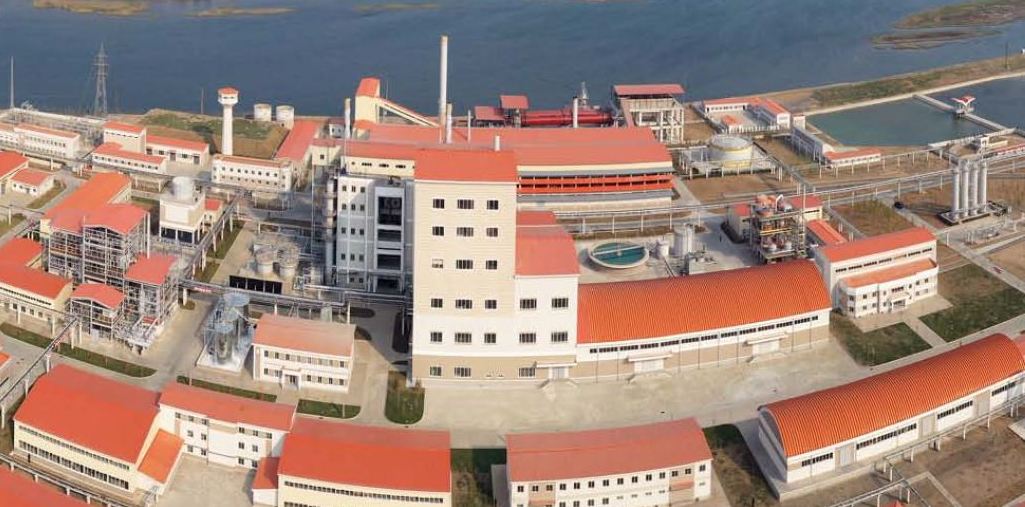
Sunchon Phosphate Fertilizer Factory opened May 1,
2020 as part of the construction of a
new chemical
industry base.
The chemical sector is considered a "core
industry" and "lifeline
for the construction of the self-supporting
economy and the improvement
of the people's standard of living."
The central task of the chemical industry "is to
give precedence to
building up our own technical forces, step up the
improvement of its
structure, and drastically increase the production
of chemical goods necessary for the national
economy and the
improvement of the people's standard of living."
The chemical industry
must rely "on our own raw materials" and raise its
scientific level to ensure it serves the aim of
self-reliance.
Electricity Generation
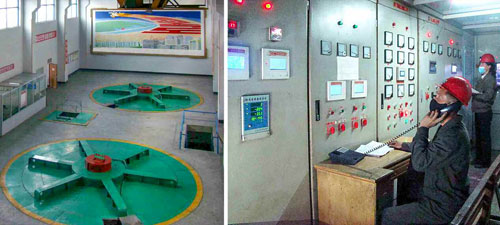
Ryongson Youth Power Station
The production of electricity is key to economic
self-reliance and
to guarantee the stable development and growth of
the national economy
and the material and cultured standard of
living for all. The electric power industry needs
"to readjust and
reinforce its production foundations as a whole
and expand them." This
includes "the construction of tidal power stations
under long-term and medium-term strategies and
launching in real
earnest the founding of the nuclear power
industry."
Mining
The Report "stressed the need to attach
importance to the mining
industry and shore it up for the sake of the
normal development of the
national economy. The basic task of the mining
industry is to reinforce and expand production to
meet the needs of the
national economy for nonferrous metal and
non-metallic minerals during
the new five-year plan period."
Coal Industry
Due to the suffocating U.S. killer sanctions and
blockade, the coal
industry has become an important outpost of
self-reliance in the DPRK,
as it has plentiful internal supplies and
extensive knowledge and experience of coal mining.
The Report outlined
a plan to propel forward "the work of intensively
supplying equipment,
materials, labour and funds to the coal
industry, securing more coal faces by giving
precedence to prospecting
and tunnelling, putting efforts into the
development of the soft coal
industry, pushing forward the work of improving
the working and living conditions of coal miners
as a priority task for
increased coal production and taking measures for
the effective use of
coal."
Machine Industry
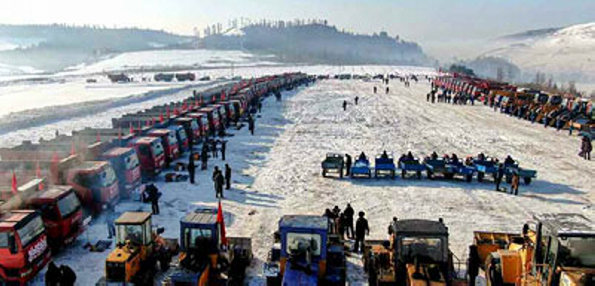
Display of DPRK-produced farm equipment
The Report defined the machine industry as an
important sector
leading and propelling forward the overall economy
and its many
sectors. It demanded an intense examination of the
current state and orientation of the machine
industry. The aim is to
change its direction to the creation and
development of "modern and
high-performance machine products including
machine tools, vehicles, building machines,
electric machines, mining
machines and hydraulic machines."
Agriculture
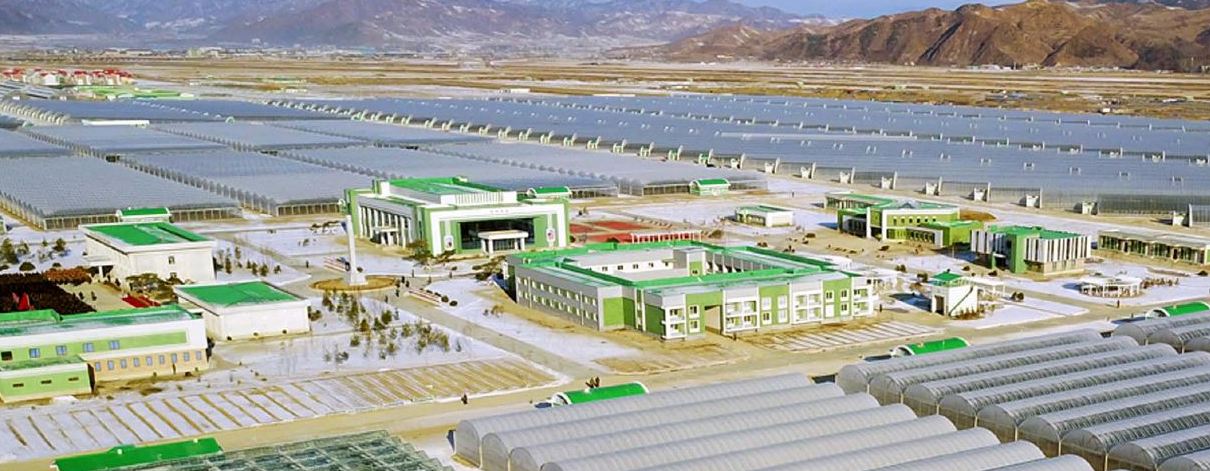
Large-scale greenhouse production of produce
"The main targets set forth for the agricultural
sector are matters
of paramount importance for the state that must be
attained whatever
the cost in order to ensure self-sufficiency in
food
supply."
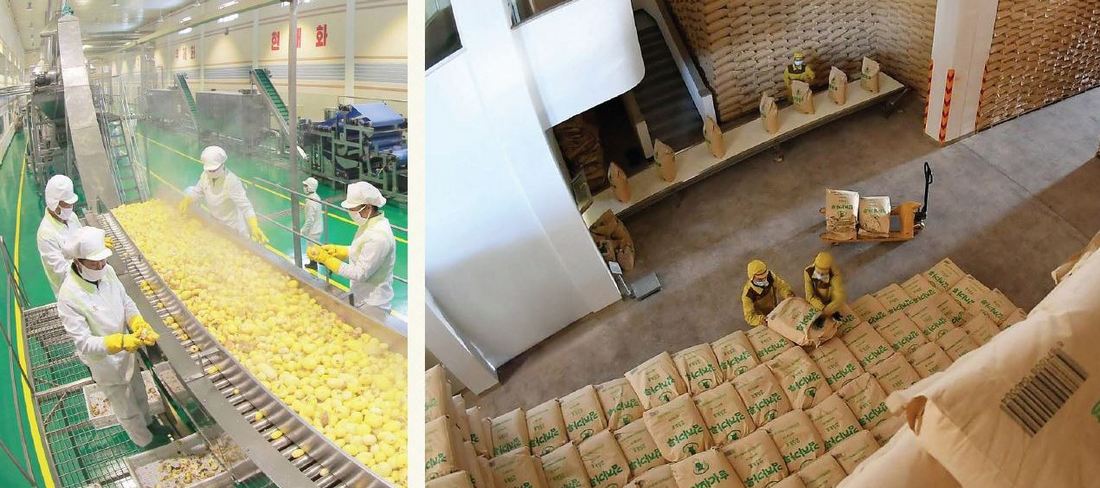
Samjiyon Potato Flour Factory
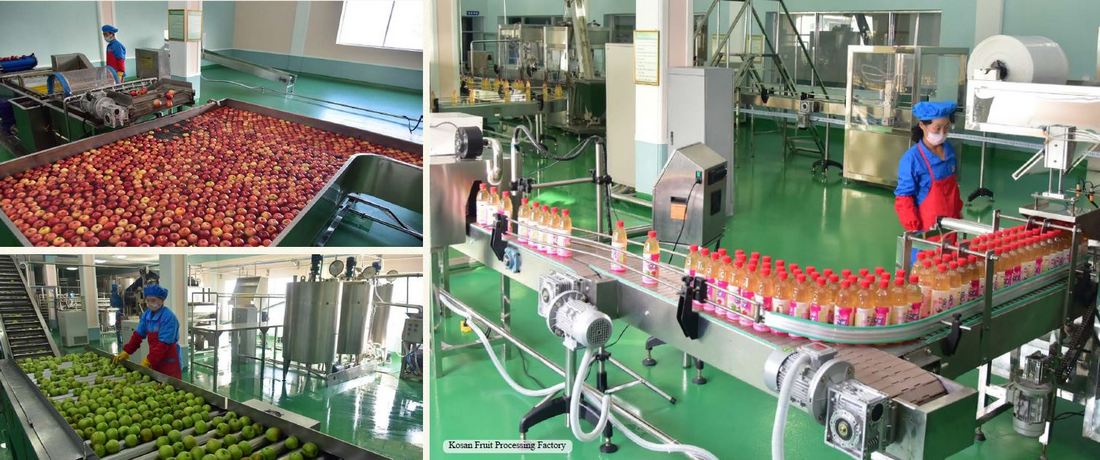
Kosan Fruit Processing Factory
Forestry
The Report underlined the need for the forestry
sector to strengthen
its own material and technological foundations and
satisfactorily meet
the need of the national economy for timber
while keeping in mind the balance of timber
production and
afforestation.
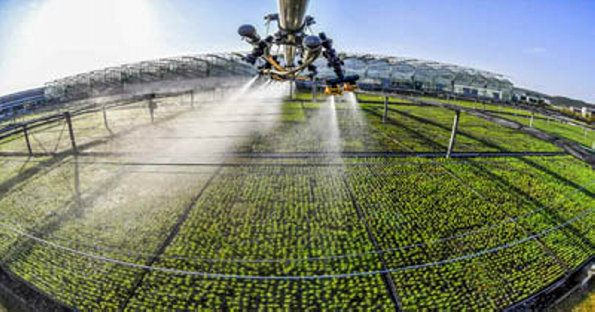
Tree nursery
Transportation

The
Report outlined targets to improve and modernize
rail transport
throughout the country ensuring its safe
operation. The Pyongyang Metro
received special attention with projects to
update its operations and renovate its stations. A
necessity exists
throughout the country "to produce a larger number
of means of public
transport, including new-type subway trains,
trolley
buses, tramcars and buses" to make travel more
convenient for people.
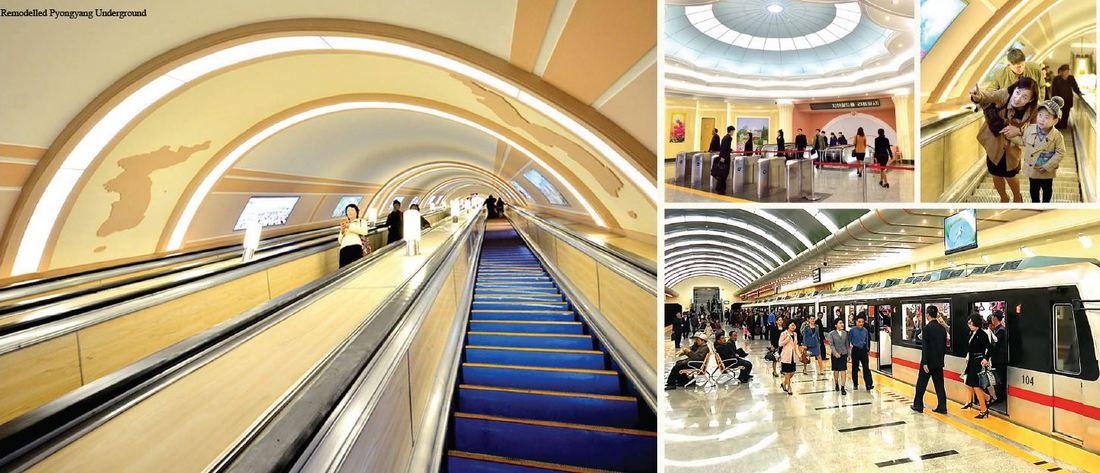
Pyongyang subway
Construction Sector
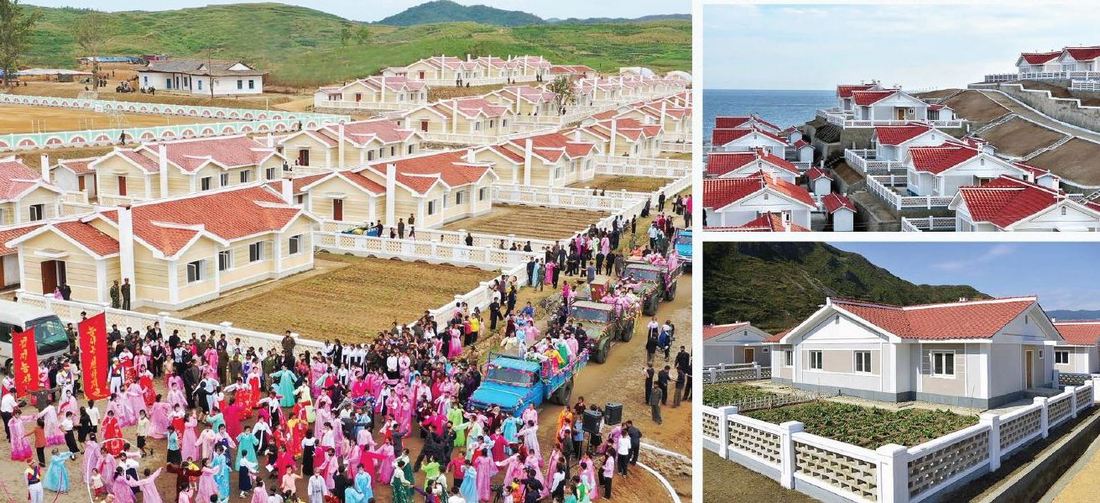
New housing built to replace areas damaged by
typhoons
The construction sector is tasked with building
more and better
housing for the people to meet modern cultured
living standards and
"radically change the appearance of the
country."
Two fronts exist simultaneously in the
construction sector:
"industrial construction for strengthening the
economic foundations of
the country, and construction to meet the material
and
cultural needs of the people."
Specifically, a goal is to construct 10,000 new
flats a year in
Pyongyang alone during each of the coming five
years to meet the needs
of its citizens. Another is immediately to build
25,000 houses in the Komdok mining area in the
east. Komdok is a
leading nonferrous mineral producer where a large
contingent of workers
lives. Last September 3, Typhoon Maysak hit
Komdok causing catastrophic damage with floods and
landslides. The plan
is "to build Komdok into a mining city with no
comparison in the world."
"The basic tasks facing the building materials
industry during the
new five-year plan period is to attain the goal of
producing 8 million
tons of cement and ensure self-sufficiency in
finishing materials."
To achieve this goal the existing cement
factories need renovation
and "new large-capacity, up-to-date cement
factories" must be built "in
areas with favourable conditions for materials
and electricity supply and transport."
Self-reliance in finishing materials is
imperative to meet the large
demand. Paints using locally available raw
materials have to become
more available along with roofing materials.
On the front of producing building materials, the
plan is "to
construct more zero-carbon and zero-energy
buildings in keeping with
the world trend in architectural development." The
"provinces should produce various building
materials in large
quantities" that "rely on their locally available
raw materials" giving
rise to sizeable new value for reinvestment.
Fishing
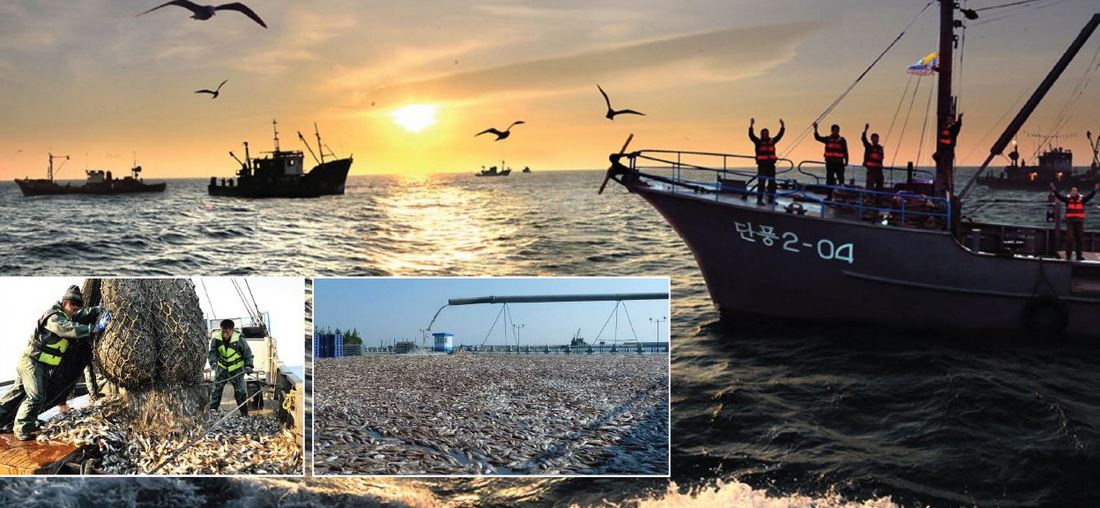
"The Report defined the fishing industry as one
of the three fields
directly related to the people's diet. The fishing
industry should
modernize fishing vessels and implements, put
fishing
on a scientific basis and build up fishery
stations and ship repair
yards. It is necessary to systematically increase
seafood production by
substantially conserving and propagating the
nation's
aquatic resources in a planned way and launching a
mass drive for
aquaculture."
The Report discussed other sectors such as
communications with plans
to update its infrastructure and "turn mobile
communications into a
next-generation one" to develop the conditions
so "people in all parts of the country, ranging
from cities to remote
mountain villages can enjoy a better cultural and
emotional life."
The discussion also dealt with problems and
actions to be taken in
state-run commerce, public catering and welfare
services, and the tasks
necessary to support the people and promote
their material and spiritual well-being. The aim
is to create "a new
socialist service culture of our own style."
"The Report presented land management and
ecological environment
protection as important affairs for protecting the
lives and health of
the people and improving the landscape of the
country." The plan is to make decisive progress in
land development to
preserve and protect the environment. Of
importance is to grasp
"through surveys the overall situation of the
environment including forests; to deal with their
seasonal and annual
changes correctly and promptly; to enact laws and
regulations for the
protection of the land and environment and
implement them strictly to prevent natural
disasters through an
intensified campaign of afforestation and water
conservation; to make
great efforts for road construction and
management,
and push ahead with eastern and western coastal
improvement projects in
a big way through national mobilization to protect
the lives and safety
of the people, conserve land, and spruce up
the country's coastal areas as befits a maritime
nation."


Fish farms are being developed throughout the
country

Fish processing plant
Building City Infrastructure
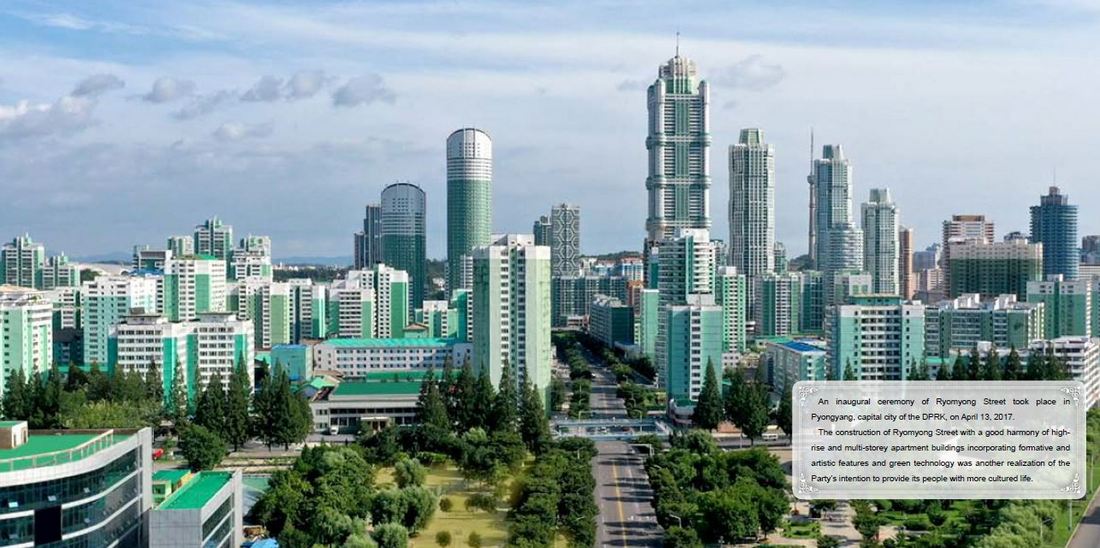
Redevelopment of Ryomyong Street in Pyongyang
The Report stressed the importance of city
management, which is
directly related to the life of the people, and
set forth relevant
tasks dealing with housing, water, sewage
treatment
plants, and the prevention of environmental
pollution, and to enhance
landscaping of the cities and their parks and
recreation grounds.
Tourism
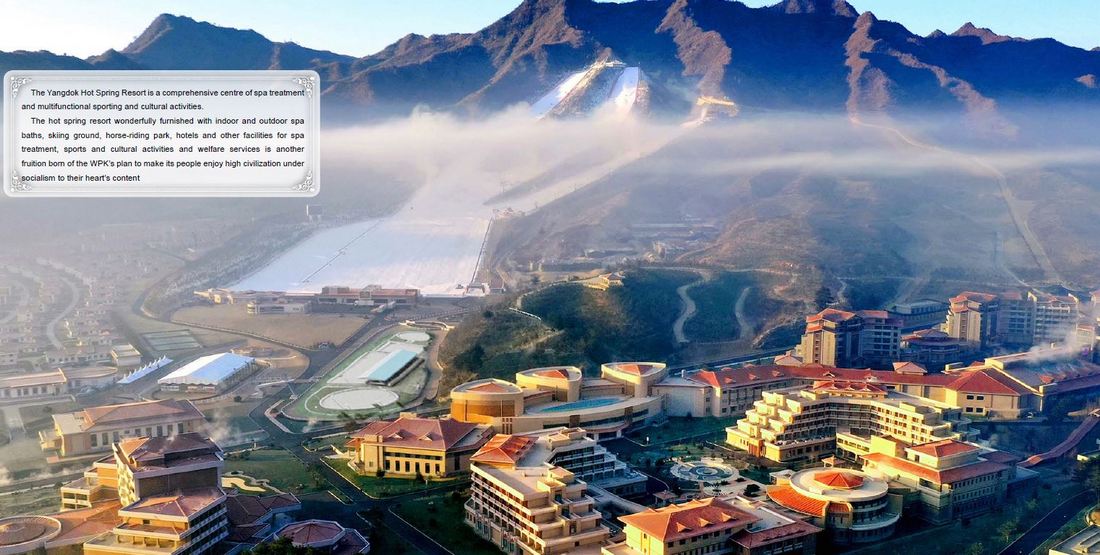
Yangdok Hotsprings resort
The Report raised the issue of boosting tourism
so that people
around the world can become better acquainted with
Koreans and vice
versa. Specifically it referenced the Mt Kumgang
area, the Port of Kosong, the Pirobong
mountaineering tourist area, and
the Haegumgang coastal park and the necessity for
new construction "in
harmony with the beautiful scenery," which
expresses "the emotional and aesthetic feelings of
our people."
In sum, "the fundamental requirement and
direction in improving the
management of the socialist economy are to put the
masses of the
people, the masters of society, at the centre of
all considerations and give priority to their
demands and interests."
Dealing with the Relation Between Urban and
Rural Life
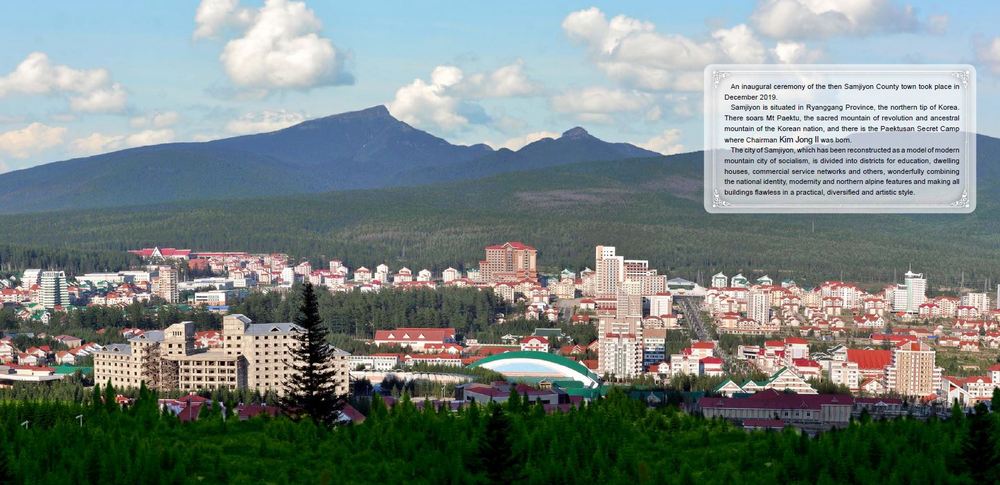
Samjiyon has been redeveloped as a model city in
the mountains
The Report discussed the necessity "to eliminate
disparities between
the working class and the peasantry, the gaps
between industry and
agriculture and differences between the urban
and rural areas."
The general goal as defined in the Report is not
to eliminate the
distinct qualities of counties but in fact retain
and develop their
"inherent characteristics." The local economy is
encouraged to use "the raw and other materials
available to it in
accordance with the regional characteristics" and
for the people
through "the Party committees and People's
committees to
become a powerful engine propelling the
development of their regions,
the master of the local economy and administrator
responsible for the
livelihood of the people in their regions."
National Defence
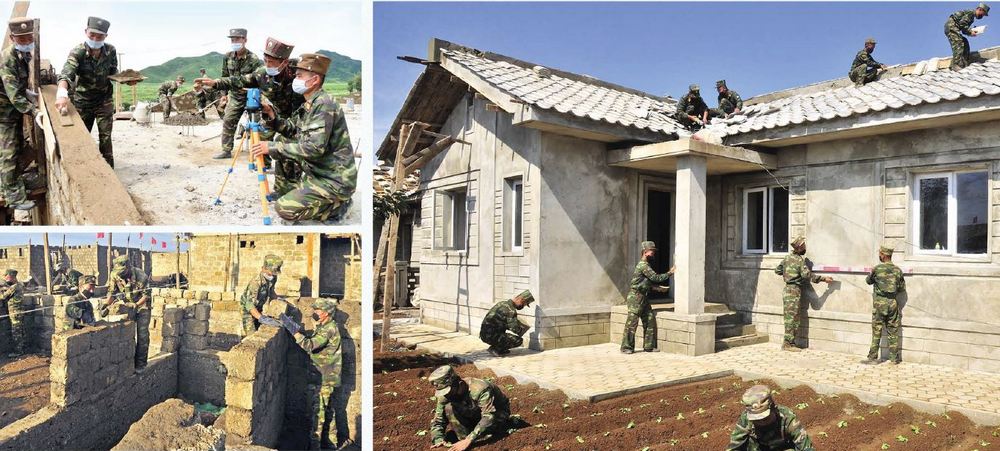
Soldiers assist in reconstruction of housing after
recent natural disasters
The discussion on the economy dealt with the
reality that investment
must be set aside for national defence. "As long
as imperialism remains
on the earth and the danger of war of
aggression by the hostile forces against our state
remains, the
historic mission of our revolutionary armed forces
can never be changed
and our national defence capability must be
steadily
bolstered along the track of new development."
The Report makes the sober assessment that the
armed forces of the
U.S. imperialists still occupy the south of their
country and have
numerous military bases throughout Japan and the
Pacific Ocean armed with the most advanced
weaponry including nuclear
bombs. Within this situation the defence industry
must reaffirm its
great tradition of self-reliance and capability
and "rapidly advance the Korean People's Army from
a conventional type
into an elite hi-tech one by developing military
science and technology
and inventing more advanced weapons and
combat equipment." The primary target of the
defence sector must be to
make "military equipment intelligent,
high-performing, precise,
unmanned and light."
As always, the task of defence of the country can
only be
accomplished with the mass mobilization of the
people to prepare to
resist the invaders and drive them from Korea. The
"all-people resistance" is "a matter of crucial
importance that should
never be neglected in firmly consolidating the
national defence
capability." The Report stresses that
strengthening
national defence is crucial "until the vicious
cycle of the brink of
war and detente, tension and dialogue is removed
once and for all and
such words as threat and blackmail by the hostile
forces disappear from this land."
Science and Technology
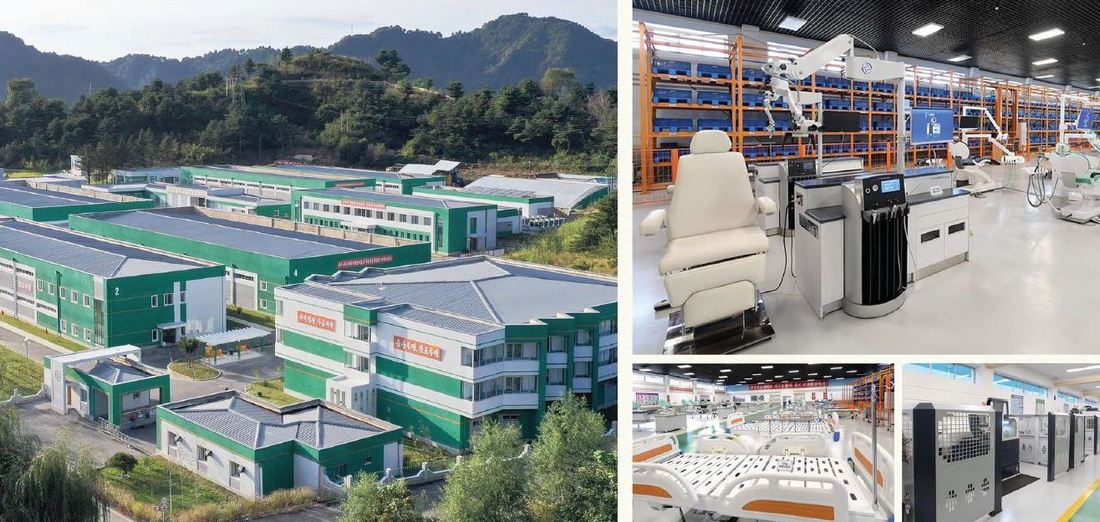
Myohyangsan Medical Appliances Centre
The Report underscores the importance of
developing "science and
technology as a crucial task and an optimum policy
in socialist
construction." Goals have been set to advance
science
and technology in each sector of the economy "as
well as the relevant
ways and means to achieve that goal." Within this
aim, all sectors will
"share scientific research findings and
vigorously push forward with the work of making
all the people well
versed in science and technology."
The Report raised the general goal to develop
mass education to turn
the people and country "into an educational power,
a talent power, by
bringing about radical improvement in
education." Increased investments in education
must be made at all
levels including enhancing the abilities and level
of teachers and
furnishing the material requirements of education
including new schools.
Increased investments must also be directed to
public health to
improve the quality of medical care and treatment.
Again, self-reliance
is key in providing the material means of
health care including pharmaceuticals and hospital
supplies and to
"build up the ranks of medical workers and create
a reliable
anti-epidemic basis for coping with whatever world
health
crisis may erupt."
The Report also made serious analysis of the work
in the field of
art and literature, the media and sports, and set
forth tasks to usher
in a new era of efflorescence of all fronts in
culture, sports and recreation.
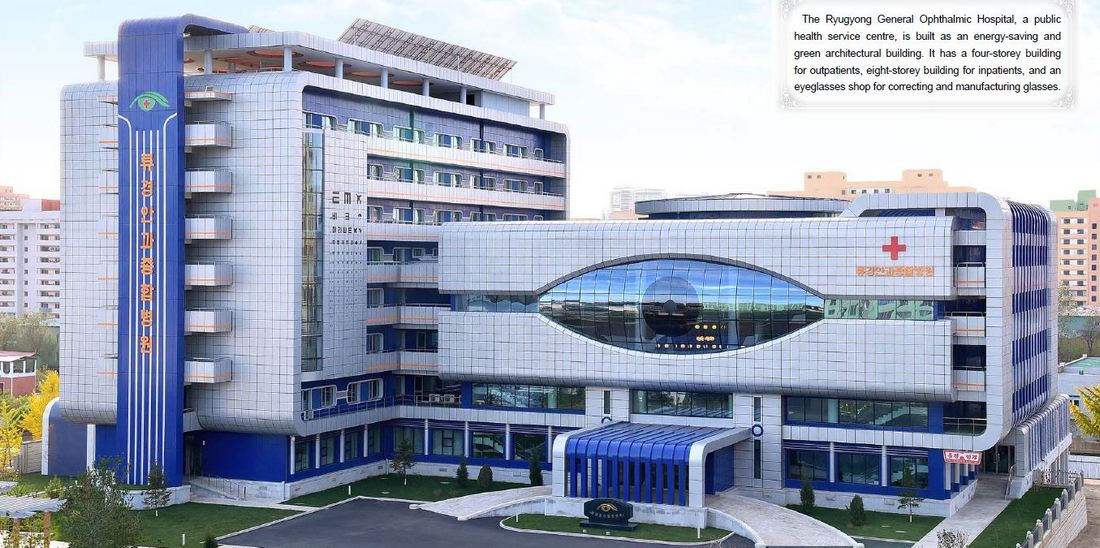
Ryugyong Ophthalmic Hospital

(To access articles
individually click on the black headline.)
PDF
PREVIOUS ISSUES
| HOME
Website: www.cpcml.ca
Email: editor@cpcml.ca
|


 Kim Jong Un, the Supreme Leader of the DPRK, presented the Report on
the work of the Central Committee of the WPK since the previous congress in 2016, which was
thoroughly discussed.
Kim Jong Un, the Supreme Leader of the DPRK, presented the Report on
the work of the Central Committee of the WPK since the previous congress in 2016, which was
thoroughly discussed. 


 This initiative was
organized by U.S. and south Korean peace
groups, including: Korea Peace Campaign of
Veterans for Peace; Korea
Peace Network; Korea Peace Now!
Grassroots Network; Peace Treaty Now; Women Cross
DMZ; Women's International League for Peace and
Freedom; Civil Peace
Forum; Korean Women's Movement
for Peace; and South Korean Committee on June 15th
Joint Declaration.
This initiative was
organized by U.S. and south Korean peace
groups, including: Korea Peace Campaign of
Veterans for Peace; Korea
Peace Network; Korea Peace Now!
Grassroots Network; Peace Treaty Now; Women Cross
DMZ; Women's International League for Peace and
Freedom; Civil Peace
Forum; Korean Women's Movement
for Peace; and South Korean Committee on June 15th
Joint Declaration. In the mid-1950s,
just after the Korean War, the U.S. and ROK began
combined military exercises in south Korea that
prepare for war with north Korea. In the 1970s the
drills
developed into large-scale exercises that mobilize
considerable
weapons, equipment and the deployment of U.S.
troops stationed in both south Korea as well as
U.S. bases outside the
Korean Peninsula. Since the 2000s they have been
based on operation
plans that reportedly include pre-emptive strikes
and "decapitation
measures" against the north Korean leadership. Due
to their scale and provocative nature, the annual
U.S.-ROK combined
exercises have long been a trigger point for
heightened military and
political tensions on the Korean Peninsula.
In the mid-1950s,
just after the Korean War, the U.S. and ROK began
combined military exercises in south Korea that
prepare for war with north Korea. In the 1970s the
drills
developed into large-scale exercises that mobilize
considerable
weapons, equipment and the deployment of U.S.
troops stationed in both south Korea as well as
U.S. bases outside the
Korean Peninsula. Since the 2000s they have been
based on operation
plans that reportedly include pre-emptive strikes
and "decapitation
measures" against the north Korean leadership. Due
to their scale and provocative nature, the annual
U.S.-ROK combined
exercises have long been a trigger point for
heightened military and
political tensions on the Korean Peninsula.
 Kim Jong Un
clarified the WPK's principled stand on
inter-Korean
relations as follows:
Kim Jong Un
clarified the WPK's principled stand on
inter-Korean
relations as follows:  The overriding
objective factor for the economy during the past
five
years was the U.S.-led killer sanctions and
blockade of the DPRK --
enforced by Canada as well -- which cause great
hardship for the people, and the ongoing threats
of military
annihilation. In addition the country was battered
yearly with severe
natural disasters and last year with the global
pandemic.
Taking all of this into account, the leader of the
DPRK, Kim Jong Un
said in his Report to the 8th Congress of the
Workers' Party of Korea (WPK),
"the successes of the WPK in the last five
years in its revolutionary struggle and
construction work are no small
matter."
The overriding
objective factor for the economy during the past
five
years was the U.S.-led killer sanctions and
blockade of the DPRK --
enforced by Canada as well -- which cause great
hardship for the people, and the ongoing threats
of military
annihilation. In addition the country was battered
yearly with severe
natural disasters and last year with the global
pandemic.
Taking all of this into account, the leader of the
DPRK, Kim Jong Un
said in his Report to the 8th Congress of the
Workers' Party of Korea (WPK),
"the successes of the WPK in the last five
years in its revolutionary struggle and
construction work are no small
matter."



















